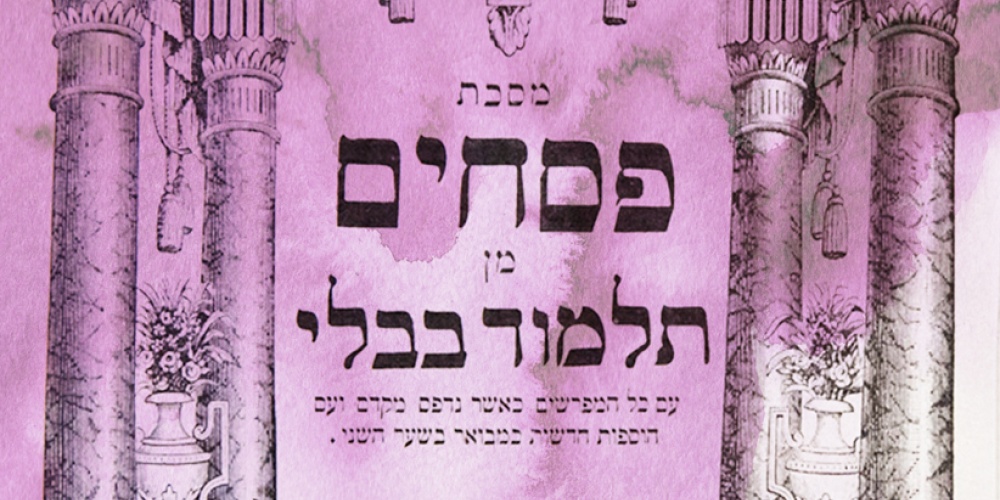
One of the principles of Biblical interpretation is that the Torah is not necessarily written in chronological order, ein mukdam umeuchar baTorah. Thematic considerations are generally more important than chronological ones.
Yet in editing the Mishna, Rebbe Yehuda Hanassi generally does follow chronological order. The shisha sidrei Mishna, the six orders of the Mishna, are written in order. Hence, masechet Pesachim opens with, “On the eve of the 14th we search for chametz with candlelight”, the first of the laws of Pesach. The Mishna then continues with the laws of biur chametz, ridding our homes of chametz, which must be done by the morning of erev Pesach. The middle chapters of the tractate discuss the mitzvah that was done at midday, the korban pesach, and the 10th and final chapter discusses the laws of the seder night. The laws of chol hamoed get their own separate masechet, Moed Katan, “The small festival’.
A similar format can be seen throughout seder Moed.
Masechet Yoma begins, “Seven days before Yom haKippurim, we separate the kohen gadol from his home”. With so much Temple work on this extraordinary day, the kohen gadol needs a week to prepare and practice getting familiar with the special Temple service.
The opening Mishna of masechet Sukkah begins with the laws of building a sukkah, something we must do even before the holiday begins.
In a similar vein, the opening Mishna of masechet Shekalim teaches that, “On the first of Adar, it [the obligation to bring half]-shekalim is announced”. This gave people 30 days’ notice to bring their half-shekel, as it was on the first of Nissan, the beginning of the new year, that the shekalim were used in the Temple service[1].
Yet it appears that masechet Pesachim should begin even earlier than the night before Pesach. “Shoalim vedorshin, one asks about and teaches regarding the laws of Pesach thirty days before Pesachr[2]”. And when one opens up the Shulchan Aruch, one notes that is exactly what Rav Yosef Karo did. Hilchot Pesach begins, “One asks regarding the laws of Pesach, 30 days before Pesach” (Orach Chaim chapter, 429). He then moves on to discuss Shabbat Hagadol, and only in the third siman, chapter 431, does he discuss the laws of bedikat chametz.
Closer analysis reveals that, while not quite as obvious, Rebbe Yehuda Hanassi did, in fact, begin the Mishna 30 days prior.
It is generally understood that the obligation of shoalim vedorshin, that we must begin the study of the laws of Pesach 30 days prior is because of its abundant laws and restrictions. With so many details and then some more details, one needs a good 30 days to ensure that one will have a “kosher” Pesach. This teaching appears no less than six times in the Babylonian Talmud, and in each of the six places, it is only the holiday of Pesach that is mentioned. It is for good reason the Vilna Gaon assumed that this teaching Pesach specific.
While the law itself is at most rabbinic[3], the Gemara derives it from the fact the Moshe taught the laws of Pesach sheni on Pesach rishon, i.e., 30 days in advance. Following this model, we, too, should begin our study of the laws of Pesach 30 days prior. This view, however, is not unanimous. Rabban Shimon ben Gamliel, in a view that actually seems more compelling, notes that Moshe Rabbeinu began teaching about the “first” Pesach, the one we actually observe, on Rosh Chodesh Nissan; and hence, one should begin the study of its laws some two weeks prior[4].
Yet this entire discussion of study 30 days prior is rooted in the desire of Gemara to understand when one becomes obligated in the mitzvah of bedikat chametz. “Rav Yehudah said in the name of Rav: One who sets sail, or who departs in a caravan more than thirty days [prior to Passover], he need not burn [the chametz]; within 30 days, he must burn it”. Wondering about the source of the distinction between before and after 30 days, the Talmud quotes the braitta of shoalim vedorshin, that one begins the study of the laws of Pesach 30 days prior[5].
If one pauses to reflect on this, one sees a most important insight into the thinking of our Rabbis. A braitta about when we should begin our study of the laws of Pesach is the source of its very first law. If we must the laws of Pesach 30 days prior, that must mean that is because these laws are relevant 30 days prior. Learning about something means putting it into practice; lilmod al menat la’asot. We do not study the laws of Passover 30 days prior because we need time to prepare for Pesach—though that, too, is a good reason—we study the laws of Pesach 30 days prior because the laws of Pesach must be implemented 30 days prior.
Rebbe begins the Mishna with the opening law of Pesach: “On the eve of the 14th we search for chametz with candlelight”. The Gemara, which explains the reasoning and sources of the Mishna, thus explains that “Shoalim vedorshin, One asks about and teaches regarding the halakhot of Pesach thirty days before Pesach.”
[1] We would expect masechet Shabbat to begin, “With what may one light the Shabbat lamp, and with what may one not light?” Yet this Mishna is the beginning of the second and not the first chapter, a conundrum that serves as the opening question of the Tosafists in masechet Shabbat.
[2] The first Mishna in masechet Sukkah also begins 30 days in advance. Beit Shammai and Beit Hillel debate whether a structure that happens to meet the requirements for a sukkah, but was not built as such, that was built more than 30 days before Sukkot can actually be used as a Sukkah. All agree that within 30 days of Sukkot, it is kosher regardless of intent. The halacha takes as a given that 30 days before a holiday, one is consciously—or subconsciously thinking of Sukkot.
[3] Tosafot (Bechorot 57b) assume that this halacha was only applicable during Temple times. Thus, the Mishna Berurah notes that nowadays, Shabbat haGadol has replaced this 30-day requirement. Nonetheless, he recommends that private individuals should study the laws of Pesach 30 days prior.
[4] Interestingly, it is in its analysis of the source of Rabban Shimon ben Gamliel’s view that the Gemara derives the principle, “there is no earlier or later (chronological order) in the Torah”.
[5] While the Gemara never explicitly says so, it would appear that Rabban Shimon ben Gamliel would absolve one of the obligation of bedikah if one travels more than 15 days before Pesach. Let us pray that this year, people will be able to travel 15, 30, and more days before Pesach.



